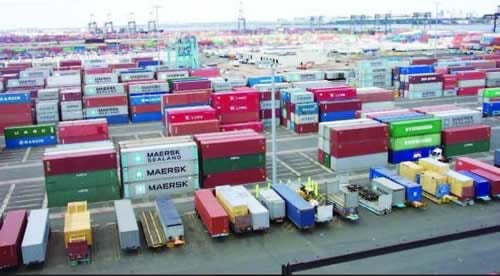
The unavailability of holding bays for empty containers has crippled port business in Nigeria, ANOZIE EGOLE writes
When the Nigerian Ports Authority granted port concessions in 2006, the idea was to boost efficiency, bring sanity to the ports, and generate more revenue for the government. But 16 years down the line, the purpose of that move seems defeated. The inefficiency of the concessionaires has led to the unavailability of holding bays for empty containers.
Before the concession of the Nigerian ports in 2006, they were riddled with inefficiency. Ship dwell times for goods in ports were prolonged due to poor port management, and that led to port congestion. Complaints of untraceable or missing cargoes were being regularly lodged against the Nigerian Ports Authority. Security inside Nigerian seaports was compromised by the activities of miscreants as theft and pilferage became the order of the day.
Touts who had no job being in the ports were seen all over the place, looting as much as they could. At some points, ships were scared of visiting Nigerian ports due to high rate of insecurity and attacks on the crew members by these touts.
In Nigeria today, the greater percentage of international trade is routed through the sea, and given Nigeria’s huge population, it is believed that the economy controls over 70 per cent of all seaborne trade in the West African sub-region. Hence, the country’s ports are increasingly challenged to meet the pressure mounted by the movement of ships and cargo in and out of the ports.
Then, cargo-handling plants and equipment owned by the NPA were few and mostly unserviceable, leading to shipping companies hiring these machines from private sector sources. Corruption was high among labour contractors and various service providers at the ports Nigerian seaports were rated amongst the costliest in the world, as a result of the compounded problems. Many port premises and quay aprons had fallen to disuse and failed road sections inside the ports made the movement of goods within port grounds cumbersome.
In what seems like an effort to address these challenges and revive the ports again, the Federal Government, 16 years ago, precisely in 2006, through the NPA, entered into concession agreements with some terminal operators for several bulks, breakbulk, and container terminals, partly on a competitive basis. One of the conditions was that they must provide the necessary facilities needed for the efficiency of the ports.
Many experts, including foreigners, lauded the move by the Obasanjo-led federal administration as so many predicted efficiency of port services, having in mind that the nation was tagged the West Africa’s maritime hub.
Obviously, adequate holding bays for receiving empty containers for shipping companies before the containers are taken back to their ports of origin were part of the facility needed for the efficiency of a port. But surprisingly, this particular facility seems to be lacking in Nigerian ports today.
Gains of concession
Even though the ports systems are still facing challenges due to lack of equipment for some of these concessionaires, no doubt, the concession arrangement may have boosted the revenue coming to NPA as records have it that the agency generated $140m in 2005 before the concession and over $450m from the Lagos ports in 2014.
The cost of port services is competitive: turnaround time has improved, percentage of berth occupancy rate has risen, and infrastructure has improved significantly. Also, the security around the seaports has become better.
The challenges
At the nation’s seaports today, it seems a lot of things were not taken into consideration before drafting the concession agreement. A visit to various terminals shows that the concessionaires didn’t consider having spaces for empty containers as the whole place was occupied with different buildings.
The Chairman of the Association of Maritime Truck Owners, Remy Ogungbemi, in a chat with our correspondent, said, “We have been speaking with them about that and there have been some adjustments, though the problems are still there. All I know is that we are trying to see how they can stop using our trucks as holding bays for their empty containers but I believe there is hope because Rome was not built in a day.”
A member of the National Association of Government Approved Freight Forwarders, Nnadi Ugochukwu, lamented that many of the concessionaires lacked the needed facilities.
“The only thing is that it has been observed that shipping companies and terminal operators do not have enough facilities to handle their empty containers. Many of them do not have holding bays outside the ports and because they don’t have holding bays outside the ports, they now compel truckers to return the empties inside the ports.”
Nnadi also said that even the terminal operators did not have enough space to receive empty containers pending when vessels would come to pick up the empties.
“And sometimes, when they are coming to drop the empties, they receive information that there is no space at the ports and no machinery to offload them, so they have to wait until there is space at the ports for them to come in and drop the containers.”
Nnadi admitted that there was no shipping company in Nigeria with a functional holding bay.
“Practically, there is no shipping company that has a functional holding bay outside the ports. Many of them have to rely on the terminals to receive their empty containers. And the terminal cannot cope with the discharge and this affects freight forwarders a lot.”
A trucker, Anthony Agbalusi, who is also the former deputy chairman, the Tin-Can Island chapter of the Roads Transport Employers Association of Nigeria, admitted that the issue was better now than it used to be in the past.
Narrating the experiences of truckers, he said that the shipping companies did whatever they wanted, opened the portal when they wanted, picked the number of containers they wanted, and allowed the rest to litter on the roads.
“We have been fighting against that issue. It has been a big fight but it is better now than before – the issue of using our trucks as holding bays. We are not working, it is only the shipping companies that are working. You will see trucks on the roads, and the shipping companies open the window when they want immediately after the ship departs. You are on your own, and your truck will be with the empty container on the road until their ship returns.
“They don’t have space inside the terminals to drop their empties, which is why you see trucks on the roads. They only take empty trucks when there are ships to take them back. You may have 2000 empty containers on the road but the ship receives only 500. So, the remaining 1500 containers will wait for another one month when another ship comes. This is why you see empty containers blocking the highways.
“They are killing our businesses every day, and the worst is the shipping companies which don’t have spaces inside the ports. If the shipping company does not give the terminal operator an order to receive an empty container, the terminal will not receive it.”
Meanwhile, in his response, the spokesperson of the Seaports Terminal Operators of Nigeria, Dr Bolaji Akiola, said, “The terminal operators don’t operate holding bays. It is the responsibility of shipping companies. NPA requires importers/agents to return empty containers to holding bays owned and operated by shipping companies.”
The way forward
In an attempt to address the issue of congestion on the ports axis which is mostly caused by the inefficiency of shipping companies and their inability to provide empty containers, the NPA had on February 27, 2021, introduced the electronic call-up system for trucks at the ports in Lagos to end the gridlock witnessed on the road.
The e-call-up system was launched alongside an app called ETO, which truckers are expected to use to book turns to enter the ports.
But bringing up ETO to address Apapa traffic without a functional holding bay is like putting a cat before the horse as the primary cause of the chaotic situation on the road has not been properly addressed.
No doubt, the dilapidated nature of the road is one of the causes but the unavailability of holding bays is one of the major causes.
According to the president of the African Association of Professional Freight Forwarders and Logistics of Nigeria, Frank Ogunojemite, there is a need for a proper look at the concession agreement with terminal operators.
He noted that an effective holding bay clearance of cargoes would be smooth even as he said that it would be difficult for ETO to work without a functional holding bay.
“We have to look at the concession agreement between the NPA, shipping companies, and terminal operators. If NPA has taken into consideration and say this is how we want the terminal to look like, they could have forced these concessionaires to have a holding bay. Without looking at the concession agreement, who do we blame?
“These people must be made to comply. So, for me, they have to look at the concession agreement; they have to also look at the government policy; and they should be forced to comply. How can you bring in containers without a holding bay? It is not fair. I believe if there is a holding bay, it will speed up the clearance time, and people will not be paying rent. I believe there must be a commission to look at this. That is why NPA introduced ETO, but it is difficult for it to be effective when there is no holding bay.”
ETO is not the only factor to consider while addressing the gridlock in that axis.”
Conclusion
Now that the concession agreements with some of the concessionaires have expired, there is a need to properly review and assess them before going into a new agreement, experts have said.





